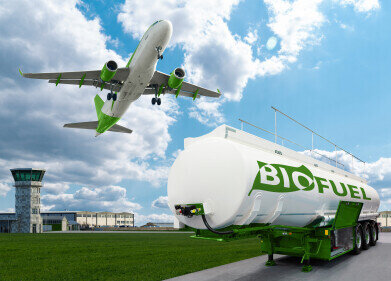Biofuel Industry News
Could biofuels become a feedstock for renewable plastics?
Jan 18 2024
In a world where plastic pollution has become a critical environmental issue, the search for sustainable alternatives is more pressing than ever. Bioplastics, made from plant-based or other biological materials, have emerged as a potential solution to this global challenge. This article examines the feasibility, benefits, and complexities of bioplastics as a sustainable alternative to traditional petroleum-based plastics.
The alarming rate of plastic production and its subsequent pollution pose a grave threat to ecosystems worldwide. With eighteen trillion pounds of plastic produced to date, and a staggering eighteen billion pounds entering our oceans annually, the urgency for an alternative solution is undeniable.
Bioplastics are derived from renewable biomass sources such as vegetable fats, oils, corn starch, and other natural materials. They are often categorized into two types: polylactic acids (PLAs) and polyhydroxyalkanoates (PHAs). PLAs are typically used in food packaging, while PHAs find applications in medical devices. The production of bioplastics offers a significant departure from the reliance on petroleum, a finite and environmentally damaging resource.
Bioplastics are touted for their potential to reduce carbon footprints, as they utilize carbon absorbed by plants during their growth, rather than releasing carbon from fossil fuels. However, this benefit is not without its challenges. The cultivation of crops for bioplastics can lead to issues such as fertilizer pollution, land use conflicts, and water resource allocation. The environmental impact of bioplastics thus extends beyond their production to encompass their entire life cycle.
The disposal of bioplastics poses another layer of complexity. While some bioplastics are designed to be compostable, this requires specific industrial conditions to break down effectively. In the absence of proper composting facilities, bioplastics can behave similarly to traditional plastics, contributing to pollution in landfills and oceans.
The market for bioplastics has seen growth in recent years, driven by consumer demand for sustainable alternatives and advancements in technology. However, the industry faces criticism for potentially diverting resources from food production and the lack of adequate composting infrastructure. These factors raise questions about the true sustainability of bioplastics and highlight the need for a holistic approach to their development and use.
Despite these challenges, the field of bioplastics presents numerous opportunities for innovation. From developing more natural alternatives like fungus-based materials to exploring new forms of biodegradable packaging, the potential for sustainable solutions is vast. The key lies in balancing the benefits of bioplastics with their environmental impacts, ensuring that they contribute positively to the global fight against plastic pollution.
Bioplastics offer a promising but complex solution to the problem of plastic pollution. Their success depends on a range of factors, including sustainable crop cultivation, efficient production processes, and the development of effective composting and recycling systems. As the industry evolves, continued research and investment are crucial to unlock the full potential of bioplastics and realize their role in a more sustainable future.
Digital Edition
PIN 25.4 Aug/Sept
September 2024
Analytical Instrumentation - Novel and Rapid LSC method for the analysis of biogenic carbon in fuels Measurement and Testing - Matrix evaluation on the Xplorer-V with Vectra autosampler accordi...
View all digital editions
Events
Nov 04 2024 Abu Dhabi, UAE
Nov 04 2024 Kigali, Rwanda
Nov 05 2024 Toronto, Canada
Nov 05 2024 Paris, France
Nov 12 2024 Cologne, Germany



















